Section 8 housing assistance vouchers are an important part of the Housing Choice Voucher Program, commonly known as Section 8. The program is funded by the U.S. Department of Housing and Urban Development (HUD).
The program is known as Section 8 because it is the eighth section of the U.S. Housing Act of 1937. Under the Section 8 program, low income families and those with disabled or elderly household members can receive rental assistance in the form of a voucher that lowers the cost of rent.
11 Facts About Section 8 Vouchers
- There Are Two Main Types of Section 8 Vouchers
- Family Income Is Most Important for Determining Eligibility
- Vouchers Require Appropriate Citizenship or Immigration Status
- Voucher Is Paid to the Landlord Directly by the PHA
- Tenant-Based Voucher Lets You Choose Your Own Housing
- Some PHAs Allow Voucher to Be Used for Homeownership
- Tenant-Based Voucher Can Be Transferred If You Move
- Project-Based Voucher Is Tied to Rental Unit, Not the Person
- With a Project-Based Voucher, You Lose Benefits If You Move Out
- Waiting List Can Take Years
- Participating Family Must Abide by Strict Tenant Regulations
The Section 8 program is a federally funded effort to ensure that low income, elderly, and disabled households have access to clean, safe and affordable housing. Under the program’s purview, more than 3 million vulnerable Americans can live in areas that are safer and higher quality than what they might be able to afford on their own.
The Section 8 HCV program is administered locally by area public housing authorities. These PHAs provide rental assistance in the form of vouchers that allow households to reduce their rent costs while landlords are still able to earn a fair market rent for their rental housing.
What Is a Housing Choice Voucher?
A housing choice voucher works much like a gift certificate. The voucher allows a household to receive a discount on its rent, and the Section 8 HCV program directly pays the landlord or property owner for the dollar value of the housing voucher. The household is then responsible for paying the difference to the landlord.
What Is a Project-Based Housing Voucher?
A project-based housing voucher is a voucher assigned to a particular rental unit. Under this model, this type of housing voucher is not attached to the tenant, so if a family decides to move from its voucher-based unit, they cannot take the housing voucher with them.
11 Facts About Section 8 Vouchers
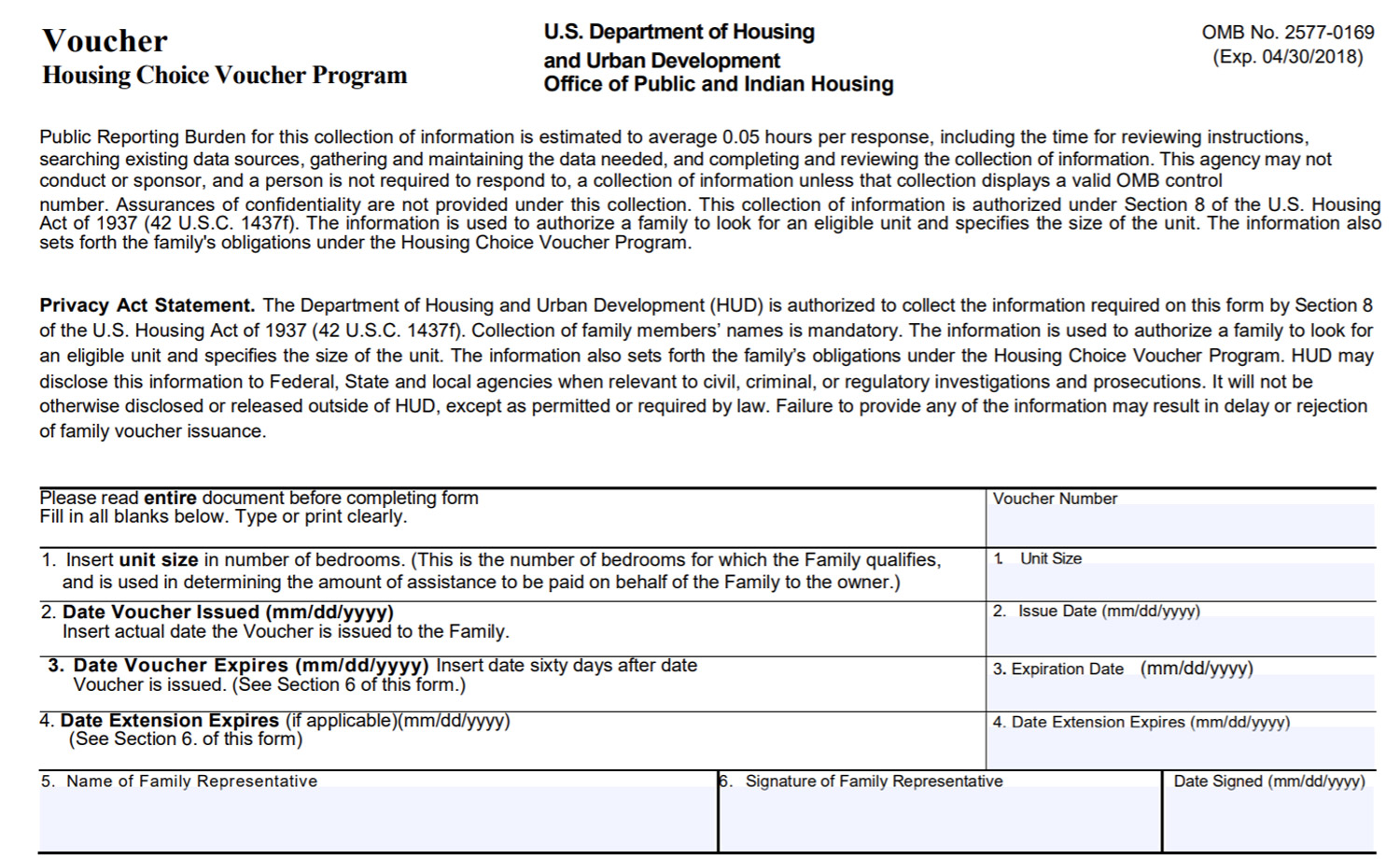
Below are some important key facts to remember about Section 8 vouchers and how they are administered.
1. There Are Two Main Types of Section 8 Vouchers
Section 8 vouchers can be divided into two groups: tenant-based, or project-based. The voucher is either assigned to the tenant, or it is assigned to a specific housing unit. With a tenant-based voucher, once you qualify for it, that housing voucher remains yours no matter where you live. You have full choice over your rental unit, geographic area, and landlord. You must make sure that the rental unit complies with HCV program requirements. Your chosen landlord or property owner must also accept Section 8 vouchers.
Project-based vouchers, on the other hand, remain with the rental units. If your family is assigned a project-based voucher for a housing unit and then decides to move, you cannot take that housing voucher with you.
2. Family Income Is Most Important for Determining Eligibility
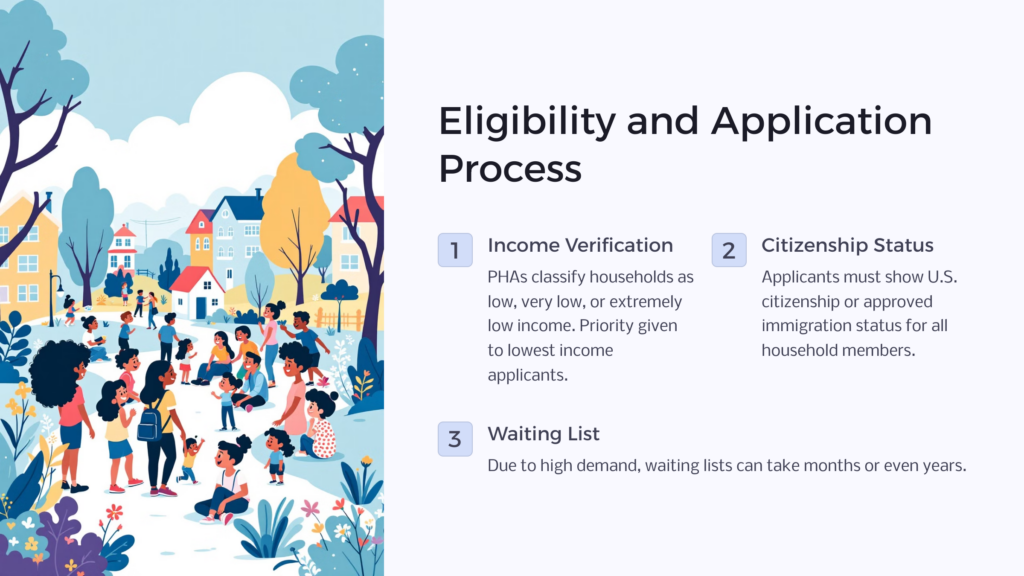
One of the main goals of the Section 8 HCV program is to ensure safe and suitable housing for those with the lowest incomes. This means that household income is one of the most powerful indicators of whether a household will be approved for voucher assistance. When you apply for Section 8 assistance, the local housing authority will verify all information about your household’s income and assets.
The public housing agency can classify your household income at one of three levels:
- Low income, which represents about 80% of an area median income
- Very low income, which represents a household income of approximately 50% of an area median income
- Extremely low income, which represents around 30% of an area median income
PHAs generally will prioritize the extremely low income applicants first, followed by the very low and then low income households.
3. Vouchers Require Appropriate Citizenship or Immigration Status
While household income is the primary factor of being approved, applicants must also meet other requirements to qualify for Section 8 assistance. Chief among them is citizenship.
Everyone in a Section 8 household should be able to show documentation that they are a U.S. citizen or that they have approved immigration status. If a household contains members who can’t meet this requirement, they still may receive some level of assistance. However, since assistance is calculated based on every household member, the level of assistance will be lower than households that can show appropriate documentation for every member of the family.
4. Voucher Is Paid to the Landlord Directly by the PHA
If you are approved for a Section 8 voucher, your local housing authority pays the amount of the voucher directly to the landlord, and you pay the remaining rent amount. The value of your housing voucher and the amount of rent you pay are determined by your household income level.
5. Tenant-Based Voucher Lets You Choose Your Own Housing
Vouchers come in two basic types: tenant-based and project-based. If you’re approved for a tenant-based voucher, that means you have more control over choosing your housing. You can pick any rental unit you like, as long as your landlord agrees to accept your Section 8 voucher and your local housing authority approves the housing unit passes HCV program guidelines.
6. Some PHAs Allow Voucher to Be Used for Homeownership
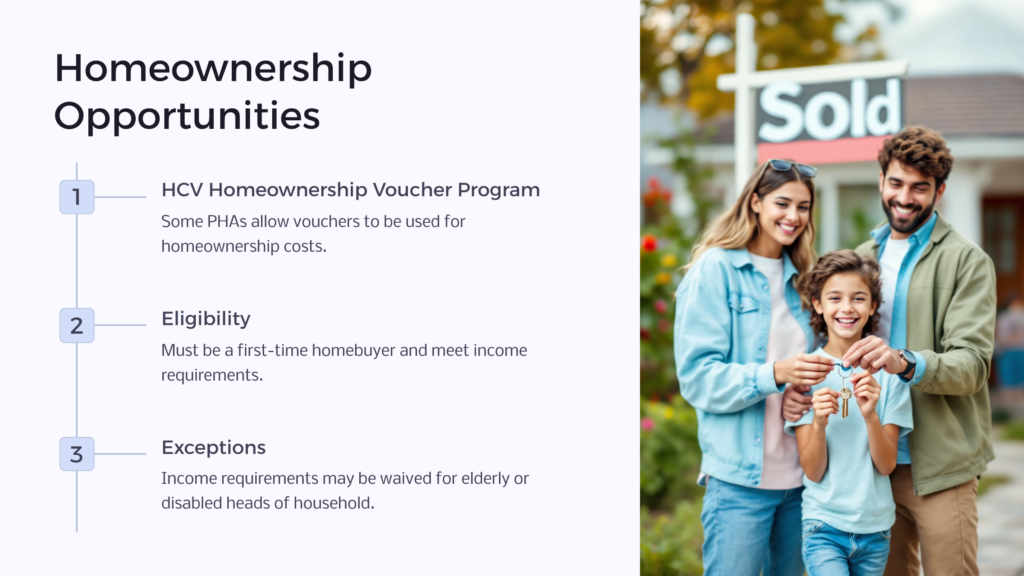
Through the HCV Homeownership Voucher program, if you’re already receiving Section 8 housing assistance, you also may be eligible to use your housing voucher toward homeownership costs. Local housing authorities are not required to offer this program, so you’ll need to check with your local public housing agency to find out if the program is available in your area.
To be eligible for this program, you must be a first-time homebuyer and meet specific income eligibility requirements. Sometimes, these income requirements can be waived if the head of the household is elderly or disabled. Your local housing authority can help you determine if your family is eligible.
7. Tenant-Based Voucher Can Be Transferred If You Move
If you’ve qualified for a tenant-based Section 8 voucher, then that means the voucher is specifically tied to you. Your voucher is portable, which means that when the time comes for you to move from your rental unit, your voucher goes with you.
You can move anywhere you like, as long as your new landlord agrees to accept your voucher. The PHA must also approve the new unit and landlord.
8. Project-Based Voucher Is Tied to Rental Unit, Not the Person
If you qualify for a project-based voucher, then the voucher you receive will be specific to a housing unit that the PHA assigns to you. In this type of arrangement, the voucher is not assigned to an individual voucher holder or household, but only to a specific rental unit.
With this model, landlords sign contracts with their local housing authorities, which stipulate that these landlords will reserve up to 25% of their rental inventory for Section 8 housing. If a Section 8-eligible family lives within each unit, the landlord then receives subsidies from the federal government to help them meet fair market rent value for those units. These contracts between landlords and their PHAs typically begin with 20-year terms, and they are also eligible for renewal at the end of a term.
9. With a Project-Based Voucher, You Lose Benefits If You Move Out
The main drawback of a project-based voucher is that it cannot go with you. If for any reason you determine that you need to move out of a Section 8 housing unit, you will not be able to take your housing voucher with you and apply it to a new housing unit.
10. Waiting List Can Take Years
The demand for Section 8 vouchers far outpaces the supply of vouchers available, so you may find that the waiting lists are extremely long. Some waiting lists may even be closed because they already contain more applicants than the public housing authority can reasonably service. Waiting months or even years is not uncommon.
11. Participating Family Must Abide by Strict Tenant Regulations
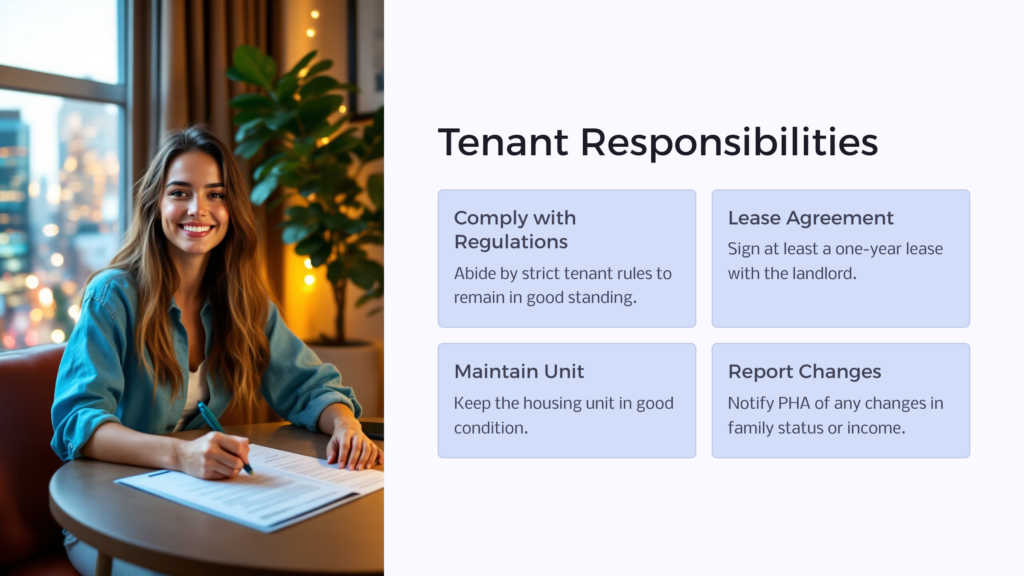
When you participate in the Section 8 HCV program, you are agreeing to the strict tenant rules and regulations that all households must abide by to remain in good standing. These regulations include rules like paying your rent on time and abiding by all stipulations within the contract you sign with your landlord.
In most cases, a household is expected to sign a lease for at least one year with its landlord. Depending on the type of housing voucher you’re using and the landlord’s expectations, you also may be required to pay an up-front security deposit. Your local housing authority may also have certain expectations beyond those stipulated in your lease with your landlord. You’ll need to make sure to understand what those expectations are and how to comply so you remain in good standing.
If household members do not comply with HCV program guidelines, they may be asked to exit the program, meaning that their housing voucher will become invalid. The tenant will be expected to cover the full cost of fair market value rent without any assistance.
Common reasons for households losing their voucher may include engaging in illegal activity within the rental unit or allowing people to live within the unit without disclosing that information to the PHA. Tenants must also maintain the housing unit according to program guidelines and notify the local PHA of any changes to family status or household income.
Section 8 Vouchers
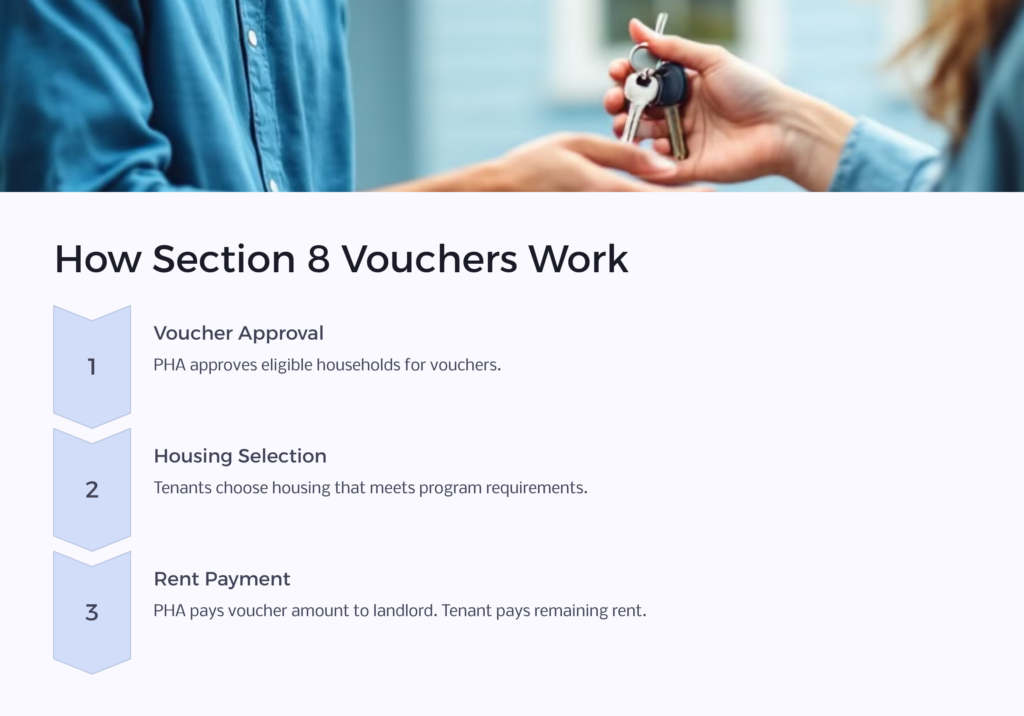
Section 8 vouchers offer valuable rental assistance to low income, elderly, and disabled households across the United States. Driven by the philosophy that all households should have access to clean, safe, and affordable housing, the Section 8 HCV program helps level the playing field for many vulnerable Americans. To find out whether a Section 8 voucher is right for you, contact your local public housing agency.
 Benefits.com Advisors
Benefits.com Advisors
With expertise spanning local, state, and federal benefit programs, our team is dedicated to guiding individuals towards the perfect program tailored to their unique circumstances.
Rise to the top with Peak Benefits!
Join our Peak Benefits Newsletter for the latest news, resources, and offers on all things government benefits.



















